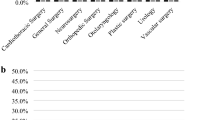Abstract
Objective
To characterize the current state of educational modalities employed within surgical training programs in the field of gender-affirming surgery, summarize the modalities utilized, and propose recommendations for installation and improvement of surgical education on gender-affirming surgery.
Background
The current state of education must first be evaluated to better understand methods attempted, present voids and gaps, and resident attitude towards plans for improvement in surgical education in this field to address the rising demand for gender-affirming surgery and enable surgical residents involved in care of GAS across various subspecialties to provide sensitive, informed, and educated care.
Methods
A scoping review was conducted. Data extraction included title, research question, data collection technique, sample size, sample characteristic, teaching modalities utilized, relevance, inclusion and exclusion criteria, and conclusion.
Results
The study includes ten qualifying reports. 7 studies included data from residents of urology, obstetrics and gynecology, plastics, ENT, and oral and maxillofacial surgery residents. The remaining three studies reported results from program directors of urology, obstetrics and gynecology, plastics, and surgical dermatology programs. Reports of didactic educational programs amongst the described studies were unclear and inexplicit. There is limited structured exposure to the care of transgender people. Simulation-based experiences structured on gender-affirming surgery curricula can significantly improve surgical trainee understanding and knowledge.
Conclusion
Robust curricula involving didactic, clinical, and competency-based evaluation models are recommended to be designed and implement in surgical training programs seeking to care for GAS patients. Department and residency cultural competence didactics and clinical measures may be established to streamline subjects surrounding TGNC patient care. Additional efforts to establish dedicated LGBT and TGNC clinics, as well as an increased effort towards interdepartmental collaboration and exposure could enhance resident education.

Similar content being viewed by others
References
Surgeons ASoP. Plastic surgery statistics report. 2017.
Puckett JA, Cleary P, Rossman K, Newcomb ME, Mustanski B. Barriers to gender-affirming care for transgender and gender nonconforming individuals. Sex Res Social Policy. 2018;15(1):48–59.
MacKinnon KR, Ng SL, Grace D, Sicchia SR, Ross LE. Protocols as curriculum? Learning health advocacy skills by working with transgender patients in the context of gender-affirming medicine. Adv Health Sci Educ Theory Pract. 2020;25(1):7–18.
Arksey H, O’Malley L. Scoping studies: towards a methodological framework. Int J Soc Res Methodol. 2005;8(1):19–32.
Vinekar K, Rush SK, Chiang S, Schiff MA. Educating obstetrics and gynecology residents on transgender patients: a survey of program directors. Obstet Gynecol. 2019;133(4):691–9.
Dy GW, Osbun NC, Morrison SD, Grant DW, Merguerian PA, Transgender Education Study Group. Exposure to and attitudes regarding transgender education among urology residents. J Sex Med. 2016;13(10):1466–72.
Morrison SD, Dy GW, Chong HJ, et al. Transgender-related education in plastic surgery and urology residency programs. J Grad Med Educ. 2017;9(2):178–83.
Morrison SD, Chong HJ, Dy GW, et al. Educational exposure to transgender patient care in plastic surgery training. Plast Reconstr Surg. 2016;138(4):944–53.
Buhalog B, Peebles JK, Mansh M, et al. Trainee exposure and education for minimally invasive gender-affirming procedures. Dermatol Clin. 2020;38(2):277–83.
Qin LA, Estevez SL, Radcliffe E, Shan WW, Rabin JM, Rosenthal DW. Are obstetrics and gynecology residents equipped to care for transgender and gender nonconforming patients? A national survey study. Transgend Health. 2021;6(4):194–200.
Chang OH, Haviland MJ, Von Bargen E, Gomez-Carrion Y, Hacker MR, Li J. Female pelvic medicine and reconstructive surgery fellows’ exposure to transgender health care. Am J Obstet Gynecol. 2018;219(6):625–6.
Massenburg BB, Morrison SD, Rashidi V, et al. Educational exposure to transgender patient care in otolaryngology training. J Craniofac Surg. 2018;29(5):1252–7.
Ludwig DC, Dodson TB, Morrison SDUS. Oral and maxillofacial residents’ experience with transgender people and perceptions of gender-affirmation education: a national survey. J Dent Educ. 2019;83(1):103–11.
Pfaff MJ, Malapati SH, Su L, Yuan N, Farias-Eisner G, Lee JC. A structured facial feminization fresh tissue surgical simulation laboratory improves trainee confidence and knowledge. Plast Reconstr Surg. 2020;145(5):1016e–7e.
Dubin SN, Nolan IT, Streed CG Jr, Greene RE, Radix AE, Morrison SD. Transgender health care: improving medical students’ and residents’ training and awareness. Adv Med Educ Pract. 2018;9:377–91.
Butler M, McCreedy E, Schwer N, et al. Improving cultural competence to reduce health disparities. Rockville: Agency for Healthcare Research and Quality (US); 2016.
Baker K, Beagan B. Making assumptions, making space: an anthropological critique of cultural competency and its relevance to queer patients. Med Anthropol Q. 2014;28(4):578–98.
Freudenreich O, Henderson DC, Sanders KM, Goff DC. Training in a clozapine clinic for psychiatry residents: a plea and suggestions for implementation. Acad Psychiatry. 2013;37(1):27–30.
Acknowledgement
We would like to thank Dr. Devin O'Brien-Coon for his feedback provided on an early draft of this paper.
Author information
Authors and Affiliations
Contributions
MM: conception and design, data collection, writing the article, performing revisions. KR: critical revisions. AK: design, critical revisions.
Corresponding author
Ethics declarations
Conflict of interest
The authors have not disclosed any competing interests.
Rights and permissions
Springer Nature or its licensor (e.g. a society or other partner) holds exclusive rights to this article under a publishing agreement with the author(s) or other rightsholder(s); author self-archiving of the accepted manuscript version of this article is solely governed by the terms of such publishing agreement and applicable law.
About this article
Cite this article
Mousavian, M., Ranganathan, K. & Kumar, A. State of educational modalities employed in gender-affirming surgery amongst surgical residencies. Global Surg Educ 1, 57 (2022). https://doi.org/10.1007/s44186-022-00065-6
Received:
Revised:
Accepted:
Published:
DOI: https://doi.org/10.1007/s44186-022-00065-6




